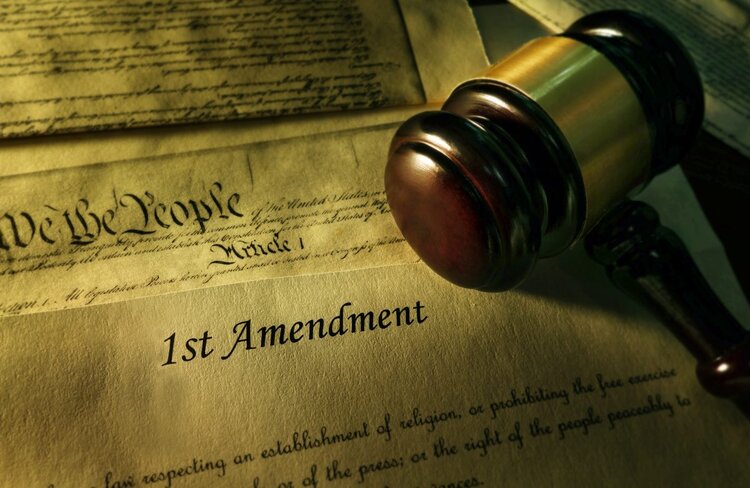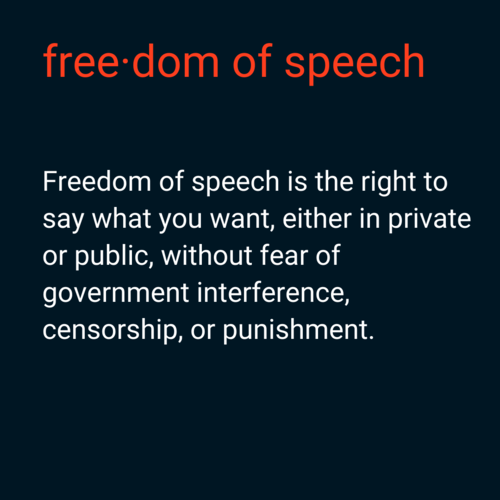It was Benjamin Franklin who said, “Without Freedom of Thought, there can be no such Thing as Wisdom; and no such Thing as public Liberty, without Freedom of Speech . . .” Indeed, freedom of speech is an all-pervasive facet of the American experience and the backbone of our democratic system. Many liberties that we enjoy each day, whether that’s speaking our minds on politics, debating hot button cultural issues, gossiping with friends, or talking about sports, are protected from government interference under the First Amendment. Freedom of speech is fundamental to our ever-evolving marketplace of ideas, our social movements, and our ability to speak out and hold government accountable.
Given how essential this freedom is to our democracy, and how ingrained it is in our every-day lives, imagining American life without freedom of speech is a difficult, almost impossible task. But let’s try.
Say you live in a small city outside of Pittsburgh. One day, you hear murmurings about a strange disease that originated in China. At first, you think nothing of it. But a week later, you read in the newspaper that the first case has been reported in Washington State. Within weeks, it is apparent that the disease has spread throughout the country and people begin testing positive in your city. You become increasingly alarmed, especially because your wife is a doctor at the local hospital. However, even though cities and states across the nation begin implementing stringent measures to deal with the outbreak, including social distancing protocols and even shelter-in-place orders, your mayor and city council refuse to take the pandemic seriously. They are worried that doing so would tank the local economy.
As many of us frequently do, you take to social media to express your dissatisfaction with the city’s policies, calling out the mayor by name, as well as key members of the city council. Your posts gain a lot of traction, and many people thank you for speaking out.
You go about your life, more hopeful that the city will listen to common sense. But two days later, when you try and log-in to Twitter and Facebook, you receive a message that your accounts no longer exist. A friend of yours in the mayor’s office informs you that the mayor, along with his business allies, pressured the tech companies to block your accounts. This obviously makes you very angry. Isn’t this a free country, after all?
You go online and begin organizing a protest against the city’s policies. You can’t use social media, but you email everyone you know, urging folks to stay home from their jobs. You conclude each message with a note about how the mayor tried to silence you. Your message resonates with thousands of people, and the next day people from all walks of life don’t go to work, convening instead in a massive Zoom chat as an act of protest.
You feel proud of the work you have done, hopeful that the city will heed the people’s words. However, your actions enrage the mayor. That night, policemen show up at your house and arrest you in front of your family for the crime of “incitement.” You also learn that several of the other people who had participated in the Zoom chat that day have been arrested as well, one of them on quite serious charges. The police discovered that she had burned the city flag in a fit of rage.

After you meet with your attorney, you decide to plead guilty to the charges. She advises you that under the emergency circumstances of a pandemic, the government has more power to punish citizens for acts of protest and incitement. You are sentenced to a year’s probation. Although obviously outraged about what’s happened, you are relieved to have avoided jail time. Your friend who burned the flag isn’t so lucky. She is sentenced to a year in prison.
Now thankfully, this scenario isn’t our reality. In the above example, it would NOT have been constitutional for the city to pressure tech companies to remove your social media accounts. This would have been tantamount to the government silencing you themselves, and speech critical of the government is the kind of speech given the MOST protection under the First Amendment. It certainly would NOT have been constitutional for the city to arrest you for the crime of “incitement.” There is such a crime as incitement, but over the years the Supreme Court has significantly restricted its application, requiring “imminent lawless action,” in part because it has historically been abused by the government in times of crisis. Regardless, staying home from your job, even if such an action causes economic harm, is not a lawless action. It is a legal act of civil disobedience.
As for your fellow protestors, it would NOT have been constitutional to arrest them for joining the Zoom protest. Protesting is given robust protection under the First Amendment’s right to peaceably assemble. And lastly, it would NOT have been constitutional for the mayor to punish the flag-burner. The act of burning the flag on its own, whether city, state, or federal, is constitutionally protected as an act of symbolic speech.
The citizens of the United States are extremely lucky to live in a place that enshrines freedom of speech (as well as the right to assemble peaceably) in the First Amendment of its Constitution. To be sure, this freedom is not absolute. It does not cover speech that could qualify as obscenity, true threats, or fighting words, for example. Regardless, freedom of speech protections in America are very broad, even when compared to other democracies, affording protection to controversial, offensive, and even hate speech. Some may take issue with the breadth of these protections, especially given an online climate that has grown increasingly hate-filled. But protecting such speech is the only way for us to know for certain that we’re protecting the crucial speech that allows the people to both hold government accountable and to express themselves in a vibrant marketplace of ideas. The alternative to this is government interference and censorship. Some countries, including some democracies, take that route. We are blessed to live in a country that does not.




